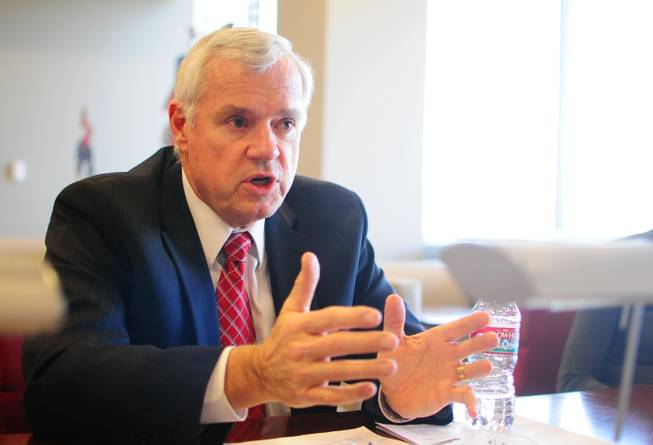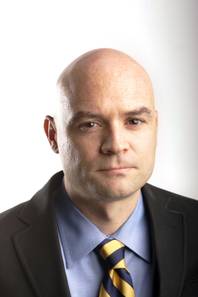
Nevada System of Higher Education Chancellor Dan Klaich discusses his legislative agenda, including the new funding formula, during a Las Vegas Sun editorial board meeting on Tuesday, Jan. 15, 2013.
Friday, March 15, 2013 | 2 a.m.

J. Patrick Coolican
Sun coverage
- Tension precedes what many hope is ‘equitable, fair methodology’ for funding higher education (08-28-2012)
- Regents: New higher ed funding formula not perfect but a step in right direction (08-24-2012)
- Higher ed funding formula stirs heated debate (08-16-2012)
- Report: Nevada education funding formula no longer adequate for urban Clark County (08-15-2012)
- Proposed funding formula for Nevada colleges puts focus on degrees earned (3-02-2012)
- Suggested early changes to higher ed funding formula are greeted warmly (1-20-2012)
- More columns by J. Patrick Coolican
- More education stories
Dan Klaich, the chancellor of the Nevada System of Higher Education, has told college and university presidents to be publicly silent about any misgivings they have with the proposed new funding formula that will divide up state money for the colleges and universities.
I was told this by a senior administration official at one of the universities, and several others in the higher education universe have confirmed it.
The new funding formula is an important issue — and one worthy of more, not less, public debate — because for decades Nevada’s process for parceling out higher education money has tilted north. A new formula should address geographic inequities and modernize our higher education system.
The presidents have been told that speaking out against the complicated and controversial new formula will carry severe consequences.
“If they violate his dictate, it is a firing offense,” the source said.
I asked Klaich about this. Following an interview, he sent me this email that summarized his position: “If I, as an officer of the board, went to Carson City and lobbied for priorities inconsistent with those of the regents, I would expect to be fired for cause, and I am sure the board would oblige me.”
I think a fair reading of that statement is that, yes, the presidents are to support the new formula, or else.
The order has reached several levels of administrators, who are under the strong impression that they are not to publicly criticize the new funding formula. In fact, I’ve tried without success to get various officials to speak on the record about the funding formula. You would think I was asking about CIA black ops.
These presidents and administrators should be judged on their performance, not on whether they toe the party line.
UNLV President Neal Smatresk gave me the following statement: “Our discussions leading up to the creation of a new funding formula were quite difficult. A number of universities and colleges are going to be challenged by the results, but at the end of the day, one of the emerging principles was that this created greater equity between community colleges and research universities, and that essential fairness was a principle we could all agree on. The presidents, the chancellor and the regents have endorsed this approach. I believe there's an expectation that we will all support the formula.”
Klaich said he had no intention of stifling academic freedom: “The universities and colleges speak with a lot of voices. There’s nothing I can do or have ever tried to do to preclude any faculty member or student from saying anything.”
When it comes to budgets and the funding formula, however, “I believe the university or college speaks through its president. The board has made clear that I as chancellor and the presidents have an obligation to support the budget as the Board of Regents have determined it.”
Klaich said when the process began, he asked the eight presidents about their priorities for the new funding formula and incorporated their suggestions into the final proposal. There also were public meetings to discuss the spending formula when administrators, faculty and others could have voiced their concerns, Klaich said.
“There was a ton of collaborative discussion, and there were times when compromises were made. When the discussion stops and it goes to the Board of Regents, then it seems to me that it’s time for those of us who participated to support what we all came up with,” he said.
But who controlled the discussion and who decided when it was time for the discussion to stop?
The senior administrative source said they are also under orders not to communicate with legislators, who ultimately will decide the fate of the new funding formula.
Indeed, the Board of Regents amended its “Procedures and Guidelines Manual” last year by instructing all higher ed institutions to work through the system office when dealing with the Legislature or the governor’s office — even if just to answer a question put to it.
Klaich explained the policy: “When we get to the Legislature, we want to speak with one organized voice, as opposed to a whole bunch of people running around with different messages. I don’t see anything draconian in that. I see that as: Can we collaborate and make sure everybody has the same information?”
Whatever the fine intentions of this rule, it could easily be abused, allowing sanction against anyone in the system who talks informally to a legislator without “coordination” with the ominous sounding “System Office.”
Although centralized communications strategy, including gag orders, are routine in the corporate and government spheres, we should be deeply skeptical of these policies when it comes to our universities, the bedrock of which are free thought and free speech. The whole point of university life is discourse.
The reason we have tenured professors and universities is so that they can make dangerous and unpopular statements about the conventional wisdoms and the shibboleths of science, government, economy and the arts. Or about the way we fund higher education.

Join the Discussion:
Check this out for a full explanation of our conversion to the LiveFyre commenting system and instructions on how to sign up for an account.
Full comments policy